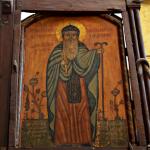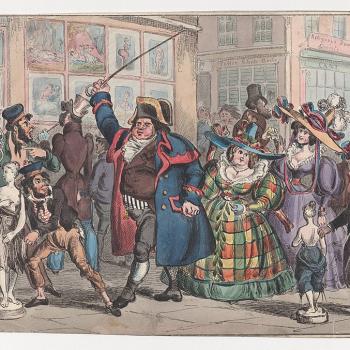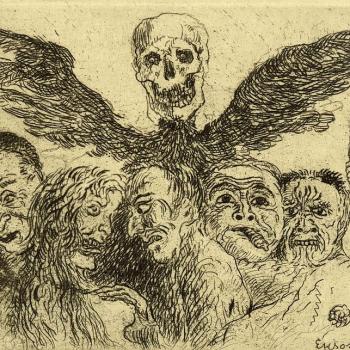
When trying to determine if someone has sinned, we can’t just say an action is morally objectionable, and so if a person does it, they have sinned. For someone to actually have sinned, the person needs to believe an act is objectionable, and yet do it anyway. If they do not know, or do not understand why a particular act is objectionable, and if they have reasons to believe engaging it might not be morally objectionable, but actually for some good, even if they are wrong (on an objective level), they do not sin. They might have engaged a fault which will have its own consequences they will have to deal with, but they are not guilty of sin. On the other hand, if they ignore their conscience and its dictates, and go against it, then, even if what they do turns out to be morally good, they still sinned, because they were willing to do what they thought was bad. They will have to deal with the consequences of their willingness to do what they believed was evil, for they were willing to follow what they believed was wrong instead of what was right. Thus, St. Alphonsus Liguori explained:
We say: 2. Someone that has an invincibly erroneous conscience, not only does not sin by acting according to it, but even that he is held to follow it at any time. The reasoning of each is that he does not sin, because although the action may not be right in itself, nevertheless, it is right according to the conscience of the one who does the act; at anytime one is held to act according to it, if his conscience, which is the proximate rule, so suggests it must be done. [1]
When looking at and examining particular actions, we should certainly consider them on an objective level, determining through our analysis, those which are objectively wrong, and why they are wrong. We must also consider, however, the subjective dimension of each act, and realize, what might be objectively wrong, might not end up being sin, or if it is a sin, realize that the subjective element involved determines in part the quality or level of sin involved.
A person can do what is objectively good, but for the wrong reasons, and indeed, for those wrong reasons do what they think is wrong, and so be guilty of sin. On the other hand, there can be someone who does what is objectively wrong, but on the subjective side, not know it is wrong, and see and desire only that which is good, and so not be guilty of sin. Similarly, when dealing with the category of mortal sin, it is important to note, only if someone believes (or knows) some action is gravely objectionable, and they do it anyway, can they find themselves engaging sin at such a level that it could be deemed “mortal sin.” This is why, when people address the actions of others, they must realize they do not have what it takes to know the conscience of the person involved, and so are not privy to the kind of sin they have committed (if any). They can, of course, talk about how morally objectionable a particular act is on the objective level, and in doing so, help someone understand why they should not engage particular acts.
Our conscience, therefore, is very important, for it gives us the light which shows us the way forward, showing us what is good, or at least, what is better than where we currently find ourselves today. When we follow our conscience, and the light it gives, we will look to where it is pointing, and try to come to know and understand what it is telling us, to learn whatever obligations we might find ourselves having to accept, and then embrace them. We are to do so at the best of our ability, with the resources which we have at hand. If we ignore it, and act against it, we will find the sting of our conscience indicating our own personal guilt, and as such, the sin which we need to repent. What we want, therefore, is to find ourselves aligned with our conscience, for then, as Photius preached, we have much to rejoice:
For when a man examines himself upon his actions, and does not find his conscience condemning him, nor wounding him with charges that he has robbed his fellows of their bare sustenance while he himself lives in luxury, or that he is sumptuously clad at the expense of his shivering brother; if he has not despoiled others of their marriage rights (and it is a proud claim to have kept his virgin purity undefiled!), if he has not made the misfortunes of others into his own delight, if he has not been a leader of unjust hands; not to mention if he has not also taken vengeance, which is a greater matter than men nowadays regard it in their everyday lives: when, as I say, a man examines himself, and does not find his conscience charging him bitter with crimes such as these, then, Oh my, how great a pleasure, how much happiness, what gladness does that man enjoy! [2]
This does not mean that we have nothing to do but stay as we are; again, the conscience is to be our guiding light, pointing the way forward so we can become better than we are today. We are to engage the inner light, but also, we are also to look to resources which can help us understand and reflect upon what it is showing us. That is, we can and should look at and engage objective moral discussions, for they will help inform us and our conscience, refining both in the process. But those resources need to be more than mere lists of what someone considers right or wrong. We need to know how and why they are right or wrong. For those actions which are morally reprehensible, we need to know why we are to avoid them. Thus, St. Alphonsus explained, moral rules or laws, while they can be and are helpful, when properly explained, do not oblige us when we do not know they particular rules have been established. “Therefore, someone is not held to the law unless he understands that he must necessarily embrace it according to right reason.” [3] And so, he said, “This is why, without the judgment of reason and understanding, the promulgation of law is no way sufficient to oblige.”[4] This, again, explains how and why, even if certain things are taught to be wrong, and someone knows they are considered wrong, but do not understand why they are wrong, their conscience can still be clear if they seek to understand and yet find no understanding and so act contrary to what others tell them to do. This is especially important, because not everyone makes good, sound decisions in making such moral rules.
Now often, for grave moral offenses, the conscience normally speaks out and directs a person not to do them, without any external rules; generally people know not to kill, not to steal, not to harm others, and so if they do so, even if they have not been given specific commands not to do such things by others (or from revealed religious texts), they know not to do them and their conscience will indicate they know they are guilty of wrongdoing:
If, on the other hand, a man’s conscience hurts because he has used for luxury his neighbour’s food, or seized his garment for gold, or has laughed at his fall, or sharpened with envy like a sword, or has undermined a marriage with which he had no concern, or has been guilty of a similar offence, I know not what that man can win to be happy, or what he can take his fill of and be pleased, or how such a man could be in a state of joy, and not bear about with him a conscience pricking at every point and consuming him inwardly, more so than the passion itself, unless he has fallen headlong into the precipice of insensibility and impiety. [5]
This is why Paul pointed out, the conscience will play a part in the eschatological judgment, for people will be judged by what they know in their hearts. “They show that what the law requires is written on their hearts, while their conscience also bears witness and their conflicting thoughts accuse or perhaps excuse them on that day when, according to my gospel, God judges the secrets of men by Christ Jesus” (Rom. 2:15-16 RSV). And this, then, is why others, like St. Hilary, will point out, what is done out of ignorance, will be shown mercy by God, because God will not condemn people for what they do not know:
To God, unto whom all the dead live, only that is destroyed which destroys itself. He Himself will be the judge of all, and in accordance with the mercy of His majesty will moderate the penalty that was deserved in the case of one who went astray through ignorance, but, for those who deny Him, He will not pass judgment upon them at that moment; quite the contrary, He will deny them.[6]
Those who know what is wrong, and why it is wrong, and what their conscience tells them to do, and that what is involved is grave and serious, are the ones who risk engaging mortal sin. But, even then, they still might have some level of ignorance, and with that level of ignorance, actually also find mercy. Since we can never know what will be, and what someone truly knows or doesn’t, we are not to make final judgments on others, and instead, we should look to them with as much mercy we can. And this, is exactly, what we are to hope for, that we will be shown mercy, even as we hope we will be shown mercy as well “The past, alas, we cannot change; we can only lament it. In silent reproach it stands before our conscience and judges us prior to the Dread Judgment. But there is no need to be terrified, for that is merely demonic intimidation. One must abhor the sin but not the sinner in whom the Lord has placed His own – albeit now sinfully profaned – image.” [7]
[1] St. Alphonsus Liguori, Moral Theology. Volume I: Books I – III On Conscience, Law, Sin and Virtue. Trans. Ryan Grant (Post Falls, ID: Mediatrix Press, 2017), 26.
[2] St. Photius, The Homilies of Photius, Patriarch of Constantinople. Trans. Cyril Mango (Harvard: Harvard University Press, 1958; repr. Eugene, OR: Wipf & Stock, 2017), 52 [Homily 1].
[3] St. Alphonsus Liguori, Moral Theology. Volume I: Books I – III On Conscience, Law, Sin and Virtue, 70.
[4] St. Alphonsus Liguori, Moral Theology. Volume I: Books I – III On Conscience, Law, Sin and Virtue, 68.
[5] St. Photius, The Homilies of Photius, Patriarch of Constantinople, 53 [Homily 1].
[6] St. Hilary of Poitiers, The Trinity. Trans. Stephen McKenna, CSSR (New York: Fathers of the Church, Inc., 1954) 170.
[7] Sergius Bulgakov. Spiritual Biography. Trans. Mark Roosien and Roberto J. De La Noval (Brooklyn, NY: Angelico Press, 2022), 164-5, [27/IX/10.X.1925].
Stay in touch! Like A Little Bit of Nothing on Facebook.
If you liked what you read, please consider sharing it with your friends and family!













